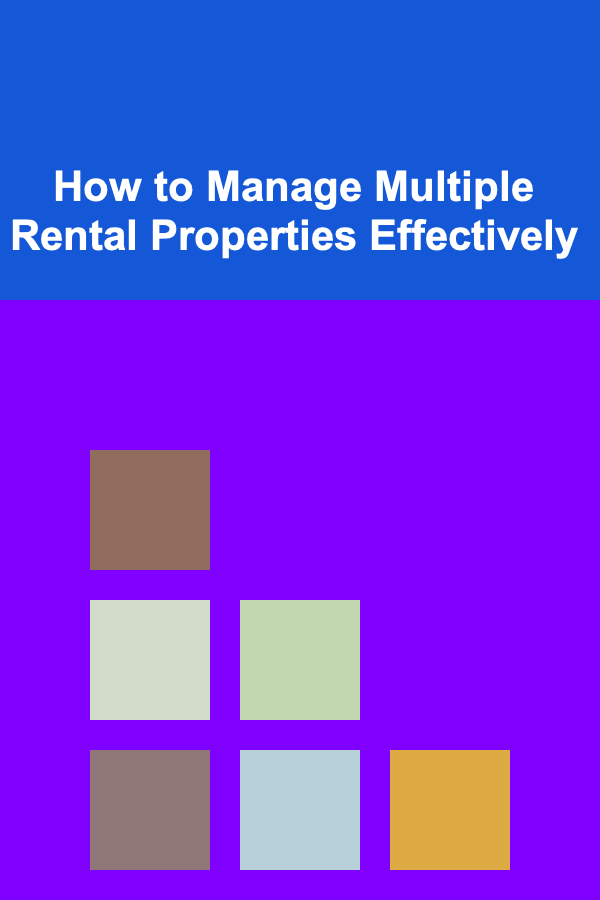
How to Manage Multiple Rental Properties Effectively
ebook include PDF & Audio bundle (Micro Guide)
$12.99$5.99
Limited Time Offer! Order within the next:

Managing multiple rental properties can be a daunting task, especially as your portfolio grows. Whether you're an experienced landlord or just starting, effective property management is crucial for maximizing profitability, maintaining tenant satisfaction, and ensuring your properties run smoothly. The complexity increases when managing multiple units, each with its own tenants, maintenance needs, and legal requirements. This article will explore the best practices and strategies for managing multiple rental properties effectively, offering guidance on everything from organization and tenant communication to financial management and legal compliance.
Organization and Time Management
The first and most crucial step in managing multiple rental properties is staying organized. Without a systematic approach, it's easy to overlook important tasks, miss deadlines, or forget key details. Here are some tips for staying organized:
1.1 Create a Centralized System
For multiple rental properties, it's important to have a centralized system to manage all aspects of your properties. This could be a physical filing system, but in today's digital age, using property management software or cloud-based tools can save time and improve accuracy. A property management software can help centralize various functions, such as:
- Tenant information
- Lease agreements
- Payment histories
- Maintenance requests
- Financial records
Using a digital solution ensures that all data is accessible from anywhere, and it reduces the chances of losing important documents.
1.2 Time Blocking and Prioritization
Time management is essential when overseeing several properties. One of the best strategies for this is "time blocking," which involves dedicating specific blocks of time to particular tasks. For instance:
- Monday mornings could be reserved for rent collection and reviewing payment statuses.
- Tuesday afternoons could be dedicated to maintenance follow-ups or property inspections.
- Fridays can be set aside for responding to tenant inquiries, reviewing lease agreements, or handling other administrative tasks.
Time blocking helps you focus on one task at a time, reduces stress, and ensures that no aspect of property management is neglected.
1.3 Create an Annual Calendar
An annual calendar is a simple tool that can help you stay ahead of important dates and deadlines. Some key dates to consider include:
- Lease renewal dates
- Maintenance schedules (e.g., HVAC inspections, pest control)
- Tax filing deadlines
- Property insurance renewals
- Rent due dates
Having these dates mapped out on a calendar allows you to plan ahead and avoid last-minute scrambling.
Tenant Management and Communication
Effective communication and strong tenant relationships are vital for successful property management. As you manage multiple properties, consistent and clear communication is essential to ensure tenants are happy and rent is paid on time.
2.1 Set Clear Expectations from the Start
When you first lease a property, setting clear expectations is crucial for preventing issues down the road. Be upfront about your policies, including rent collection, maintenance procedures, pet policies, and late payment penalties. Ensure tenants understand their responsibilities and know how to contact you in case of an emergency or issue.
2.2 Maintain Consistent Communication
With multiple rental properties, it can be easy to overlook communication with tenants. But clear, consistent communication is essential to maintaining positive relationships and addressing problems before they escalate. Here are some tips for maintaining good communication:
- Email or Text Communication: Use email or text messages for non-urgent matters and to keep a written record of communication.
- Tenant Portal: Consider using a tenant portal where tenants can submit maintenance requests, pay rent, and access lease documents. This reduces the need for phone calls and helps tenants feel more involved in the management process.
- Personalized Attention: Take the time to address any concerns or issues tenants might have. A simple phone call or email to check in can go a long way in fostering good relationships.
2.3 Handling Complaints and Maintenance Requests
Tenant complaints and maintenance requests are inevitable, but handling them promptly can prevent bigger problems from arising. Implement an efficient system to track maintenance requests and ensure that they are addressed in a timely manner.
- Set Up an Online Maintenance Request System: Allow tenants to submit maintenance requests online, either through a tenant portal or via email. This ensures you receive detailed information about the problem and gives you a clear record of the request.
- Prioritize Requests: Not all maintenance issues are urgent. Set up a system to prioritize requests based on severity. For instance, emergency issues like plumbing leaks should be handled immediately, while non-urgent issues, like repainting a wall, can be scheduled for later.
- Follow Up: After completing a maintenance task, follow up with tenants to ensure the issue has been resolved to their satisfaction.
Financial Management
Managing multiple rental properties requires careful financial oversight. Accurate financial tracking and budgeting are essential to ensure your properties are profitable and that you're not spending more than necessary on repairs, utilities, and other operational costs.
3.1 Create a Separate Bank Account for Rental Properties
A separate bank account for your rental properties makes it easier to track income and expenses. By keeping your personal and business finances separate, you can easily monitor the financial performance of each property. This will also help you when it comes time to file taxes, as you won't need to sift through personal transactions to find property-related ones.
3.2 Track Rental Income and Expenses
Accurate tracking of rental income and expenses is vital for maintaining a healthy cash flow and preparing for taxes. Use accounting software or a spreadsheet to track:
- Rent payments
- Security deposits
- Maintenance costs
- Property taxes
- Insurance premiums
- Utilities
- Advertising and marketing costs
Keeping detailed financial records will also help you evaluate the profitability of each property and identify areas where you may be able to reduce costs.
3.3 Budget for Maintenance and Repairs
One of the largest expenses for property managers is maintenance and repairs. Setting aside a portion of your rental income for these costs ensures that you're not caught off guard when a major repair is needed. A good rule of thumb is to set aside 1% to 2% of your property's value annually for maintenance.
Regular maintenance helps prevent larger, more costly repairs down the road. Ensure you are budgeting enough to keep your properties in good condition and avoid unexpected expenses.
3.4 Establish a Rent Collection System
Rent collection is the lifeblood of your rental business. With multiple properties, it's important to establish a consistent, streamlined rent collection system. Here are a few ways to make this process easier:
- Online Payments: Offer tenants the ability to pay rent online, either through a tenant portal or a third-party payment service. This reduces the chance of missed payments and makes rent collection more efficient.
- Late Fees: Implement a clear late payment policy, including a reasonable late fee. Make sure tenants are aware of this policy upfront and include it in the lease agreement.
- Automated Reminders: Set up automated rent reminders to ensure tenants are aware of upcoming due dates.
A reliable rent collection system ensures you are consistently paid on time and reduces the likelihood of cash flow issues.
Legal Compliance and Documentation
When managing multiple properties, staying compliant with local, state, and federal laws is essential. Non-compliance can lead to legal issues, fines, or even lawsuits, so it's crucial to stay informed about the regulations that affect landlords.
4.1 Know the Local Laws and Regulations
Landlord-tenant laws vary widely depending on your location. Make sure you understand the regulations governing rent control, tenant rights, eviction procedures, and safety standards in your area. Ignorance of the law is not a valid defense in case of a legal dispute, so staying informed is key.
4.2 Keep Detailed Records
Maintaining accurate and up-to-date records is vital for legal compliance and to protect yourself in case of a dispute. Some documents you should keep include:
- Lease agreements
- Tenant applications
- Rent payment records
- Maintenance requests and repair records
- Correspondence with tenants
These documents may be required in case of a legal dispute, and having them readily available can save you time and stress.
4.3 Security Deposits and Evictions
Handling security deposits and eviction processes properly is essential for legal compliance:
- Security Deposits: Ensure you understand the rules regarding security deposits in your area, including how much you can charge, how to handle disputes, and when you need to return the deposit after a tenant moves out.
- Evictions: If you need to evict a tenant, make sure you follow the legal process carefully. This includes providing proper notice, filing court documents if necessary, and attending the eviction hearing.
Eviction laws can be complex, and mishandling the process can lead to significant legal consequences. Always follow the law to protect your rights as a landlord.
Using Technology to Streamline Operations
Managing multiple rental properties requires efficient workflows, and technology can help streamline many tasks. In addition to property management software, consider using:
- Accounting Software: Tools like QuickBooks or Xero can help you track income and expenses, generate financial reports, and manage taxes.
- Tenant Screening Tools: Use online tenant screening services to quickly assess potential tenants' credit, rental history, and criminal background.
- Automated Communication: Set up automated email or text message reminders for rent payments, lease renewals, or maintenance schedules.
Investing in technology can save you time, reduce the risk of errors, and help you manage your properties more efficiently.
Conclusion
Managing multiple rental properties is no small feat, but with the right strategies, tools, and mindset, it can be highly rewarding. By staying organized, communicating effectively with tenants, keeping track of finances, staying legally compliant, and using technology to your advantage, you can maximize your success as a property manager. While the tasks may seem overwhelming at times, taking a systematic and proactive approach will ensure your rental properties remain profitable and well-maintained.
Reading More From Our Other Websites
- [Organization Tip 101] How to Create an Organized Space for Group Fitness Classes
- [Polymer Clay Modeling Tip 101] Best Tips for Crafting Intricate Lace Patterns with Polymer Clay
- [Home Rental Property 101] How to Add Value to Houses for Rent with a Workshop Feature
- [Tiny Home Living Tip 101] Best Solar Power Solutions Tailored for Tiny Home Living
- [Home Renovating 101] How to Navigate the Permit Process for Home Renovations
- [Home Cleaning 101] How to Clean a Child's Room and Keep It Organized
- [Home Renovating 101] How to Renovate Your Home to Fit Your Growing Family's Needs
- [Personal Care Tips 101] How to Choose a Toothbrush That Works with Your Toothpaste
- [Simple Life Tip 101] Best Simple‑Living Meal Prep Strategies for Busy Professionals
- [Personal Finance Management 101] How to Track Your Spending Without Feeling Overwhelmed

How to Balance Risk and Reward in Your Portfolio
Read More
How to Build a Party Supplies Checklist for Sports Viewing Parties
Read More
How to Organize Your Kitchen for Better Storage Efficiency
Read More
How To Create a Minimalist Living Room
Read More
The Step-by-Step Guide to Basic Car Maintenance
Read More
Mastering Diplomacy in Strategy Games: A Comprehensive Guide
Read MoreOther Products

How to Balance Risk and Reward in Your Portfolio
Read More
How to Build a Party Supplies Checklist for Sports Viewing Parties
Read More
How to Organize Your Kitchen for Better Storage Efficiency
Read More
How To Create a Minimalist Living Room
Read More
The Step-by-Step Guide to Basic Car Maintenance
Read More